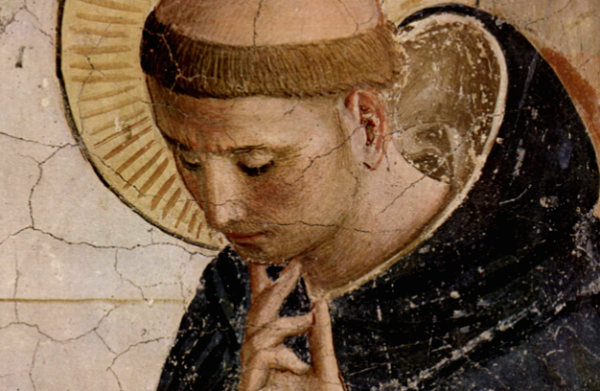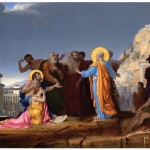Why Aquinas’ Argument for God Succeeds and Others Fall Short
by Karlo Broussard
Filed under The Existence of God
NOTE: This is the first of a two-part series. The second part will be shared on Wednesday.
Does God exist? Readers here at Strange Notions are well aware that throughout the centuries there have been no few attempts in constructing arguments to support an affirmative answer to this question. This is no less true today (I previously took a shot at making my humble contribution to the discussion here at Strange Notions, which you can read in six parts). Christian philosophers have put forth a considerable amount of effort in constructing supporting arguments for God’s existence. As good as some of these arguments are, however, in my opinion they often fall short in accomplishing what arguments in the Thomistic tradition accomplish.
For example, the transcendent creator that one arrives at in the modern presentations of the Kalam cosmological argument does not escape the question “What created the creator?” Such a creator, at least without employing Thomistic metaphysical principles, can only be seen as very powerful but not pure power or act itself—the purely actual being. The Kalam creator is merely a being among other beings and not the ipsum esse subsistens (“subsistent being itself”) of the Thomistic tradition that makes the question “What created the creator?” as incoherent as the question “Who is the bachelor’s wife?” Furthermore, the transcendent creator of the Kalam argument, as presented in modern formulations, only escapes the boundaries of physical time but does not escape what the medieval philosophers called aeviternity (outside of temporal, material existence but still not the absolute eternity of God – i.e., the mode of being of the angels). The Kalam creator of modern arguments is still subject to movement from potency to act; thus subject to change; thus subject to being caused; hence once again the question “What created the creator?”
The purpose of this two-part series is to offer a metaphysical approach to God’s existence that follows closely the Thomistic tradition (a bit different than my previous set of articles on God’s existence posted here at Strange Notions) and is not subject to the weaknesses mentioned above. The methodology employed for the present approach is partially inspired by Fr. Joseph Owens’ method found in his book entitled An Elementary Christian Metaphysics, which in turn draws from St. Thomas Aquinas’ “existential proof” as found in his work entitled De Ente Et Essentia (On Being and Essence). The argument presented in this article takes the modus tollens form of a conditional syllogism:
Premise 1: If all of reality consisted only of those things whose being is accidental and prior to its nature—i.e., a thing that does not have being by nature—then nothing would exist.
Premise 2: But things do exist.
Conclusion: Therefore, all of reality cannot consist of only things whose being is accidental and prior to its nature. There must exist within all of reality at least one thing that has being essentially and whose act of being is coincident with its nature—i.e., its nature and being are one and the same.
For the present article I will assume that the reader affirms Premise 2—namely that he or she and the world around us exists. Consequently, Premise 1 will be the sole focus for arriving at the conclusion but only after three preliminary metaphysical principles are established, which are drawn from Fr. Owens book mentioned above: 1) the accidentality of being to nature in sensible things, 2) the priority of being to nature in sensible things, and 3) every entity whose being is accidental and prior to its nature—whether sensible or non-sensible (immaterial)—it must receive being by some agent outside itself.
After we arrive at the type of being stated in the conclusion, we will then proceed to deduce the various attributes that make such a being worthy of the traditional term God.
The Accidentality of Being for Sensible Things
Concerning sensible things, metaphysicians often speak of at least a conceptual distinction between what a thing is and that it is—the distinction between the nature (essence) of a thing and its being (existence). But is there any justification for such an idea? Fr. Joseph Owens offers two lines of reason by which one can arrive at this conclusion.1
The first line of reason considers the two ways in which a sensible thing can have being. First, a thing can have being in the world that exists outside thought or imagination. For example, a house may have being today in the world outside the minds of the neighborhood residents though not tomorrow if the city is going to demolish it to make room for downtown parking. This way of existence is called real being.
The other way that something may exist or have being is in the mind or imagination—what metaphysicians call cognitional being. For example, the aforementioned house would have existed in the mind of the architect (cognitional being) before it existed in the outside world (real being). Or the house could exist in the mind of the residents (cognitional being) while the house is standing and even after it is destroyed.
So, with the distinction between real being and cognitional being in place, the question arises, “How does this distinction indicate that a thing’s nature and its being are not entirely the same?” To use the aforementioned example of the house and apply it to the above reasoning, one may say that the house has real being today, will lose that way of being tomorrow when it’s demolished, but still retain cognitional being in the minds of the neighborhood residents. If the nature (essence) of the house remains the same as it loses one way of being and acquires another, then apparently the nature of the house is at least conceptually different than its being.2
The second line of reason for demonstrating the distinction between the nature of sensible things and their being follows the abstraction of forms in human intellection. Consider the example of man’s knowledge of a tree. When one observes an oak tree, he or she abstracts the nature (form) of treeness and then is able to apply that idea to any other mode of existence that the nature of a tree may have—such as a pine tree.
Now, the nature (essence) of a tree, in and of itself, cannot include any particular existence it may have. For example, if treeness was determined to exist only in the pine tree way, then no oak trees would exist. Similarly, if treeness was determined to exist only in the oak tree way, then no pine trees would exist. But pine and oak trees do exist. Therefore, treeness itself does not include the oak tree mode of being or the pine tree mode of being. The same would apply for any mode of being for a tree. Consequently, being does not belong to the nature of a tree.
So, in light of the two lines of thought above, one can conclude that the nature of a sensible thing must be distinct from its being. In other words, being lies outside the nature of sensible things.
Now, as metaphysicians point out, if being does not belong to the nature of sensible things, then being must be an accident (i.e., non-essential) for sensible things. This is based on the metaphysical principle that whatever is in a thing that does not belong to it by nature belongs to it accidentally—e.g., the red triangle does not have redness by nature but only accidentally. “But,” one may ask, “How can being be an accident when it transcends (hence the term transcendental) the nine Aristotelian accidental categories of being?” As Fr. Joseph Owens answers in his book, although it cannot be an accident in the “predicamental sense,” or what metaphysicians call a “narrow sense,” it still can be considered an accident in a “wide sense” simply because it is not part of a sensible thing’s nature.3
The Priority of Being to Nature in Sensible Things
The second preliminary metaphysical principle is the priority of being to nature or essence in sensible things.
At first glance it seems pretty obvious that being is prior to nature since if being was not ontologically presupposed, then there would be no nature. “But,” one may object, “Does not being itself arise from composition within the thing, and consists in that composition? For example, being is not found in the mere matter of sensible things nor is it found in the mere form of sensible things but only in the composition of the matter and form. Therefore, it seems that the component parts, namely form and matter in this case, are prior to being.” How does one respond?
As Fr. Joseph Owens explains, the answer lies in the fact that principles of nature that constitute the being of a sensible thing, namely form and matter, are secondary and concomitant aspects under which being is conceptualized and do not express the deepest character of being—namely act or perfection.4 Being is the actuality or perfection of whatever is actual or perfect in a thing—it is actuality unqualified.
For example, being is the actuality of the act of being a man or the actuality of the act of being a horse. There can be neither an act of being a man (form and matter) nor an act of being a horse (form and matter) without actuality or being. So, as Fr. Owens concludes in his book, “As an existential composing it [being] is absolutely prior in actuality to the nature it makes be.”5 The bottom line is that without being the composite nature of a sensible thing would not exist. Being, therefore, is ontologically prior to nature for sensible things.
Stay tuned for Part 2 of this post on Wednesday!
Related Posts
Notes:
- See Joseph Owens, An Elementary Christian Metaphysics (Houston, Texas: Center for Thomistic Studies, 2011), Chapter 7. ↩
- Fr. Joseph Owens proves that the distinction between nature and being in sensible things is a real distinction in Chapter 7, but this can only be proven after subsistent being is shown to exist. ↩
- See Owens, pg. 71. ↩
- See Owens, pg. 73-74. ↩
- Owens, 2011, pg. 74. ↩
Note: Our goal is to cultivate serious and respectful dialogue. While it's OK to disagree—even encouraged!—any snarky, offensive, or off-topic comments will be deleted. Before commenting please read the Commenting Rules and Tips. If you're having trouble commenting, read the Commenting Instructions.













